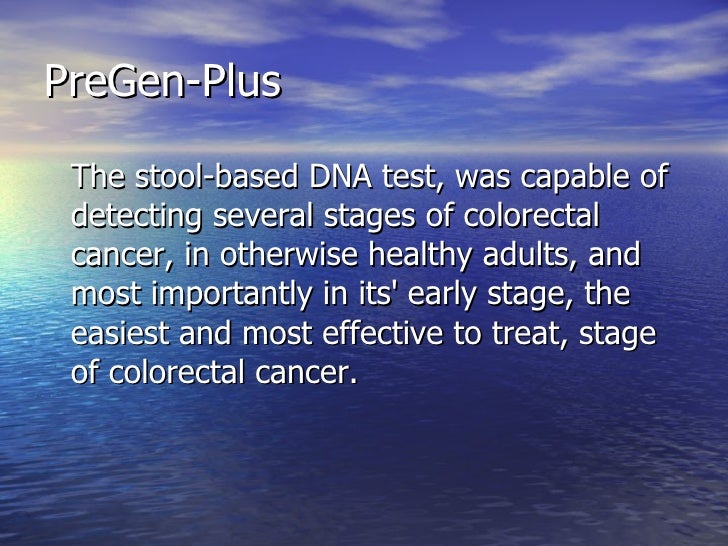Table of Content
Immunochemical testing is preferred over the guaiac fecal occult blood test because it's more sensitive. Also, it doesn't require any dietary restrictions before sample collection and testing can often be performed on a random stool sample. Screening for colon cancer is an important part of early detection and treatment. There are several different ways to do this, which include colonoscopy, sigmoidoscopy, computed tomography, and stool tests.
It may be an option if you have an average risk of colon cancer and don't have any symptoms. The fecal occult blood test is typically repeated yearly. People who purchase the Second Generation FIT test kit are able to collect the stool sample at home and receive instant results. Customers report finding the instructions easy to follow and are pleased that the test is non-invasive and does not require them to avoid any foods or medications. Customers who purchase Everlywell’s test kits collect their samples at home and return the samples to a partner laboratory that is CLIA certified.
Benefits of EZ Detect™
If you are not having this test done as needed, then you should get a fecal occult blood test every year, beginning at age 45. This test may be done along with a flexible sigmoidoscopy every five years to check for colorectal polyps or cancer. Your doctor may examine the samples with a microscope or with chemical tests. The test kit contains 5 testing pads, a performance control package, and instruction booklet. There are enough pads to test 3 consecutive bowel movements. A result card is also provided to record your results and send to your physician.
Verywell Health's content is for informational and educational purposes only. Our website is not intended to be a substitute for professional medical advice, diagnosis, or treatment. It means you have no evidence of gastrointestinal bleeding. Flushable reagent stool blood test is an at-home test to detect hidden blood in the stool. The test kit uses a small amount of the patient's blood to measure amyloid beta accumulation in the brain, allowing for earlier diagnosis and treatment.
Bleeding in children’s stool
With this knowledge, your healthcare provider can use other tests to investigate the bleeding and make a diagnosis. This means that you simply need to brush the stool sample in your toilet with the long brush provided and brush the toilet water on the test card. There are no dietary or medication restrictions that you need to follow before taking the test.

For this test, you collect an entire bowel movement and send it to a lab, where it is checked for altered DNA and for the presence of blood. The stool test requires that a person collects a sample from home and mail the sample to a lab for analysis. There are no restrictions on diet nor medications before taking the test. If you choose to purchase the Pixel FIT test, you have access to PWNHealth, an independent physician partner group that offers consultations if you get a positive result.
Best for Access to a Doctor
The colon can be subject to various diseases and conditions, including colon cancer—which is the third leading cause of death from cancer in the United States. It affects men and women equally and becomes more common as people age, but in recent years, people are being diagnosed younger and younger. Our stool test is over a 3-day period, as one day won’t give us enough information for accurate results.
One of these requires collecting a small amount of stool and the other does not. For the tests that are mailed to a lab, a small amount of stool and/or toilet water is collected and sent for testing using the tools in the kit. The guaiac-based fecal occult blood test uses the chemical guaiac to detect blood in the stool. For this test, you receive a test kit from your health care provider.
What Causes Blood to Appear in Stool?
These tests provide specific instructions, and most offer a toll-free number to call if you have questions. Colorectal cancer screening – health professional version. The U.S. Preventive Services Task Force recommendsexternal icon that adults age 45 to 75 be screened for colorectal cancer. The decision to be screened between ages 76 and 85 should be made on an individual basis. If you are older than 75, talk to your doctor about screening.

The fecal occult blood test results are largely affected by how you prepare for the test, so it is important to follow the instructions carefully. You’re likely familiar with at-home diagnostic tests, including pregnancy and COVID-19 tests. These types of tests allow people to get medical information from the safety and comfort of their homes. In order to avoid these inaccurate results, check with your doctor if you have hemorrhoids or tend to get ulcers before you follow through with the at home stool test.
Consumers register their kit through the Everlywell website once they receive their materials in the mail. A positive fecal occult blood test means that blood has been found in the stool. This test is mainly performed for colorectal cancer screening.
Older adults may also benefit from the convenience of at-home testing. The test could be incorrectly handled or stored, leading to inaccurate results. You can get results faster, which may lead to earlier treatment. It removes barriers to testing if you have limited access to medical facilities, a disability, or limited mobility. While at-home diagnostic testing is not new, a handful of testing companies have taken it one step further. The tissue changing to a blue-green color indicates an abnormal amount of blood is present in the stool.
Having a fecal occult blood test may lead to additional testing. If your fecal occult blood test result is positive, your doctor may recommend a test to examine the inside of your colon, such as a colonoscopy. Your fecal occult blood test could show a negative test result when cancer is present (false-negative result) if your cancer or polyps don't bleed. The FIT kits that are available to use at home have a wide range of costs. One brand can be found for under $10, while others can cost as much as $100.

It's important to note that stool testing is only an effective colon cancer screening option when used in combination with other methods. If your stool test comes back positive, the next step is to make an appointment with your healthcare provider, who will probably order a colonoscopy or similar test. The fecal occult blood test requires the collection of 3 small stool samples. Usually the samples are a bit of stool collected on the end of an applicator.

No comments:
Post a Comment